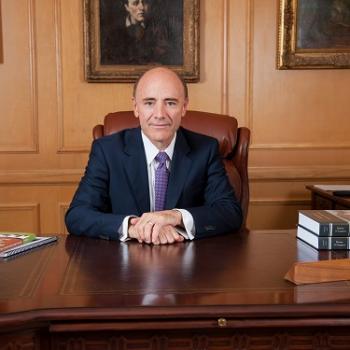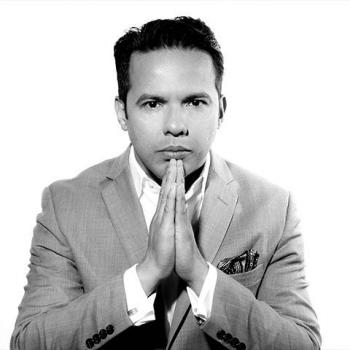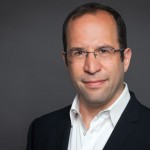To a visitor at Mars Hill Church’s Bellevue, Washington, campus, the church service looks much the same as it has for months, as churchgoers stream into the historic theater building that houses the church.
The name is gone, though, changed to “Doxa Church,” and Pastor Mark—as church members and staffers call Mark Driscoll—is not there. And he will not be coming back: The pastor who grew Mars Hill Church to a more than 12,000-attendee multisite megachurch resigned Oct. 14 after a year in which he was accused of plagiarism, misappropriating church funds to purchase best-seller status for his book Real Marriage, and exercising what church overseers called “a domineering style of leadership.”
Driscoll’s style of leadership was, in one sense, part of his pastoral persona. He was the rebel pastor, not afraid to swear or call out sin, sexual or otherwise, and charismatic in his call to “be a man.”
“Mark is a polarizing figure in Seattle and in the Christian community, and that’s kind of his trademark,” says Jennifer McKinney, a professor of sociology at Seattle Pacific University who has studied Mars Hill for the past decade. “That’s partly why he’s so popular, particularly among younger evangelicals: He says what he wants.”
Driscoll’s polarizing personality was evident particularly in the early days, says Gerry Breshears, a professor at Western Seminary in Portland who mentored Driscoll from about 2000 to 2010 and co-wrote four books with him, including Vintage Church, Vintage Jesus and Doctrine: What Every Christian Should Believe.
“That was back in the days when he got joy from saying he got hate mail from Rick Warren and Mother Jones loved him,” Breshears recalls. “The arrogance was palpable. He was, at that point, the shock jock of preachers.”
Driscoll’s shock jock voice got results. In 2012, Mars Hill Church was the third fastest-growing church in the U.S. and the 28th largest, according to Outreach Magazine.
“The goal was always, ‘We’re going to win more people for Jesus.’ The goal was good. And Mark as a preacher was pretty much right on target, but the high-pressure, performance-driven, get-results culture was deadly.” —Gerry Breshears
“You can love him or hate him, but I don’t think anyone argues with the fact that Mark is just a phenomenal communicator,” says William Vanderbloemen, founder and CEO of the Vanderbloemen Search Group, which oversees pastoral replacement searches for large churches. “When a church finds themselves with a communicator who’s that good, they can leverage that to reach people and run the danger of becoming a personality-driven church, or not leverage it. But if you’re given a gift, you’re supposed to use it.”
A Counter-Narrative
To understand Mark Driscoll and Mars Hill, you have to understand the city in which he built his church.
More than 3.5 million people live in the Seattle metro area, according to the 2010 Census, and the city itself is growing twice as fast as the surrounding area. Along with Amazon, Microsoft and other tech giants, the Seattle region houses 850 technology startup companies. The area attracts single men: Seattle and Bellevue house, respectively, 119 and 144 single men per 100 single women.
Washington was one of the first states, along with Maine and Maryland, to legalize same-sex marriage by popular vote in 2012. That same year, Washington and Colorado became the first two states to legalize recreational use and sale of marijuana.
“The church attendance here is about the same as Communist China,” Driscoll told Church Executive magazine in 2008. “There are more dogs than Christians in the city.”
It was in this “jacked up” city, as Driscoll describes Seattle in Vintage Church, that he planted Mars Hill in the spring of 1996. And the church’s explosive growth indicates that his message struck a chord.
“A church like Mars Hill really thrives in a setting like Seattle because you can cast Seattle as this crazy liberal city,” McKinney says. “Mars Hill can thrive by creating a counter-narrative … they’re standing against the liberal encroachment and beliefs of this kind of city.”
Samuel Rodriguez, president of the National Hispanic Christian Leadership Conference and pastor of New Season Christian Worship Center in Sacramento, California, says Driscoll’s church model and membership strategies influenced how Rodriguez planted his church in 2010.
“Mark Driscoll revolutionized American Christianity,” Rodriguez says. “He emerged arguably in one of the most apathetic, if not hostile, hubs of secularism. He had everything against him, but he did not just make it—he thrived.”
Fall From Grace
So what happened? How did Driscoll go from pastoring an innovative, growing megachurch in 2013 to tendering his resignation before Thanksgiving of 2014?
The events of the past year have been a tipping point, but there were cracks in the foundation years before.
Around 2010, Mars Hill restructured to operate more like a centralized business than a decentralized network of churches—a choice that may have hastened the church’s dissolution, Breshears says.
“The goal was always, ‘We’re going to win more people for Jesus.’ The goal was good. And Mark as a preacher was pretty much right on target, but the high-pressure, performance-driven, get-results culture was deadly,” he says. “The underlying culture increasingly became, ‘We must be business efficient in all we’re doing.’ More and more, Mars Hill became a brand.”
Branding and image control was important to the church, which, in some ways, seems at odds with the reformed theology Driscoll preaches, notes Kate Bowler, who teaches U.S. Christian history at Duke Divinity School.
“It’s an incredible theological mismatch between a pessimistic theology bent on proving God’s divine majesty and a celebrity culture that demands a beautiful, mostly smiling—in Mark Driscoll’s case angrily frowning—face that spawns an incredibly popular church,” she says. “It shows you the degree to which American megachurches are propelled not just theologically but by celebrity culture.”
The “celebrity pastor” phenomenon is rooted in American culture, Bowler says.
“Most of revivalism was born out of the singular vision of a few charismatic preachers,” she says. “Americans have a long tradition of looking to a magnetic person in the pulpit to show them the way forward.”
That celebrity status is “very dangerous,” says Francis Chan, author of Crazy Love and a popular pastor who says he stepped down from leadership at his California church in 2010 because he was hearing the words “Francis Chan” more than the words “Holy Spirit.”
“Jesus somehow pulled it off and was able to be humble through all the crowds and everything else. But to expect a human being to do that—it’s like asking, ‘Would it be difficult for a pastor to minister at a strip joint?’” Chan says. “I guess he could do it, but that’s a lot of temptation. I don’t know many guys who could pull it off. And that’s the way it is with fame and celebrity status.”
Driscoll’s resignation is unusual, Vanderbloemen says, as it was not prompted by serious misappropriation of funds or an inappropriate sexual relationship, but rather by a steady stream of criticism from popular bloggers, some of whom lived nowhere near Seattle.
The Internet gives thousands of people voice to weigh in on a pastor’s life and work, Chan says.
“There’s not a whole lot of good that comes from it, because if you get too much flattery, you become arrogant; if you get too much criticism, you become sad or angry, and neither of those things are good,” he says. “I don’t know what the positive outcome could be of so many people focusing on one individual.”
Driscoll’s resignation may point to the fact that churchgoers are rethinking what they want from their pastors, Bowler says.
“Personality matters. Very few people want to go to church on Sunday and listen to a cardboard speaker. But when that personality becomes the centerpiece and everything revolves around it, then we have a precarious situation.” —Samuel Rodriguez
“There’s an ongoing question in everyone’s mind about who polices megachurches,” she says. “There may be new ground being broken in how people want to hold their leaders accountable.”
While stricter accountability structures, such as denomination-like oversight, may help, it’s also important to remember that charismatic pastoral personalities are gifts, even though they have flaws.
“Personality matters,” Rodriguez says. “Very few people want to go to church on Sunday and listen to a cardboard speaker. But when that personality becomes the centerpiece and everything revolves around it, then we have a precarious situation.”
What Next?
Mars Hill ceased to exist Dec. 31, 2014, leaving in its wake about a dozen independent churches.
This could work out well. Justin Dean, former communications director for the church, says dissolution into independent churches has been one of Mars Hill’s two succession plans for several years. (Neither Dean nor Driscoll responded to requests for further comment.) However, churches in poorer Seattle communities, which have depended on funds distributed from wealthier campuses, could struggle.
The dissolution of Mars Hill speaks to another lesson: It’s important to mentor spiritual successors who can continue the work of the church after a pastor leaves.
“Mark Driscoll had many associates, he had many employees, he had many people he engaged for the church,” Rodriguez says. “But he did not nurture spiritual sons and daughters. This debacle speaks to an exclusively personality-driven church.”
A multisite church like Mars Hill, which is virtually only held together by a strong personality, has the tough decision of replacing their pastor with another charismatic leader with a similar mission or disbanding, Vanderbloemen says.
“Mars Hill has chosen a succession plan: that the best way for the movement to continue is to promote local churches,” he says. “Frankly, I think that makes sense.”
For the evangelical church as a whole, there’s a note of caution in Driscoll’s tale.
“Why do so many people attach themselves to these personalities? It puts too much pressure on us,” Chan says. “I wish they would spend more time praying for people and less time criticizing.”
The fall of a celebrity pastor is a reminder that, no matter how popular or charismatic a leader is, he or she is always flawed—but flaws don’t mean the church itself is breaking down. Breshears has been informally advising some Mars Hill pastors as they transition from satellite churches to individual church plants.
“The big corporation stuff is gone, and they’re replanting as individual churches,” Breshears says. “There’s a core of really strong people in these Mars Hill churches, and I think if they learn the lessons—and they’re working hard on learning them—and can make the cultural changes, we’re going to see some strong churches come out of this. There’s a very good chance we’ll look back in five years and be astonished.”















